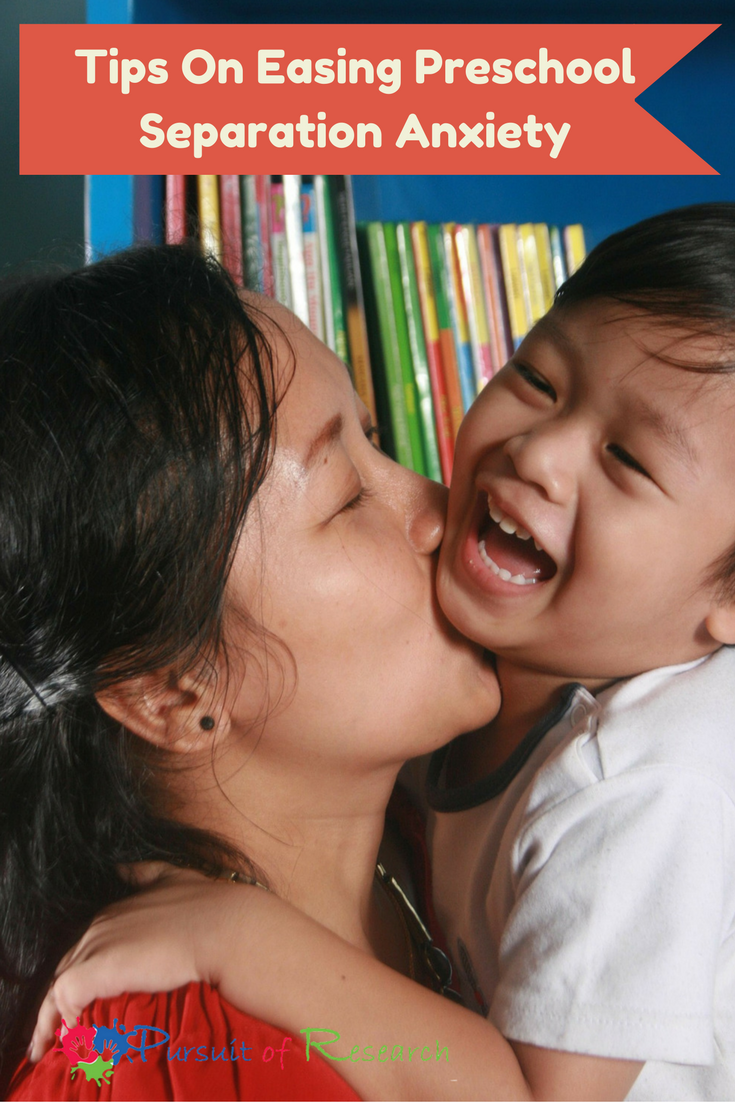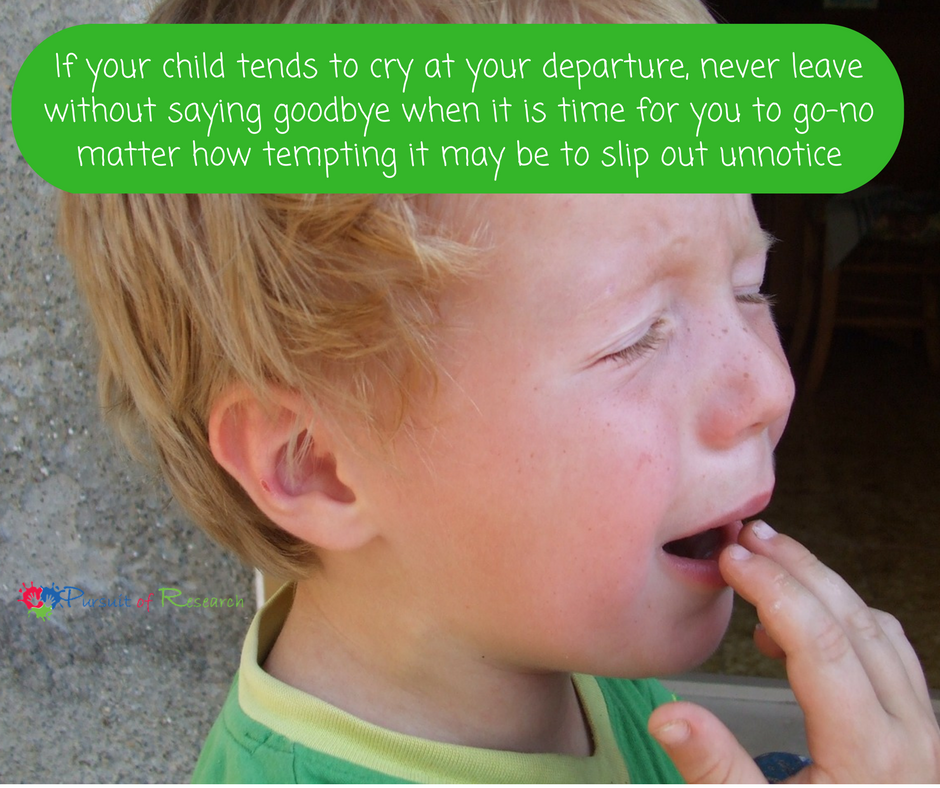According to a newsletter published by the National Association for the Education of Young Children (NAEYC), early childhood educators suggest staying in the new situation with your child the first few days, for decreasing amounts of time, until he is comfortable with his new environment. Your child will feel more comfortable with you there for part of the time, especially if he exhibits stranger anxiety, has little experience in being cared for by others, or has had a previous traumatic separation experience.
My son Tanner turned 3 and started his IEP preschool program around the time I started the support group which later became the nonprofit Cherab Foundation. Naturally, the first speaker I had for our group was a child psychologist who spoke about separation anxiety. For anyone who is running a support group this is always a popular meeting, and a subject that can even get a seasoned parent emotional thinking about those first days of school.
Just know you are not alone in your anxiety. It’s difficult to watch your essentially nonverbal apraxic son go off to preschool. Granted, it’s normal for any child to go through separation anxiety for the first days of preschool, however when a child is still learning to talk, and dependent on you to know his needs as his translator, it’s almost unbearable. Good news is there are tips to help your child, and you, get through this!
Tips
This is why a communication book is important where you can write down all the translations of what your child’s “words” or actions mean.
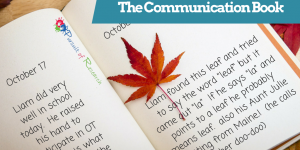 This is a book that your child carries back and forth from home to school where everyone, you, the teacher, the speech or occupational therapist write in it everyday. This way, for example, it’s easy for the teacher to talk to your child about Grandma’s new house, and it’s easy for you to know why your child has a stamp of a puppy on his hand!
This is a book that your child carries back and forth from home to school where everyone, you, the teacher, the speech or occupational therapist write in it everyday. This way, for example, it’s easy for the teacher to talk to your child about Grandma’s new house, and it’s easy for you to know why your child has a stamp of a puppy on his hand!
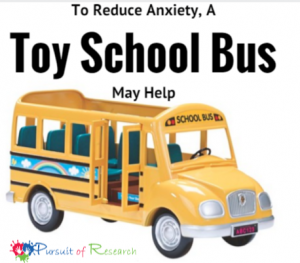 The Bus
The Bus
Tanner turned three and started school in the summer-when they do not bus. Our school district only provided a bus in the school year. The bus was not hard for us since Tanner’s big brother Dakota went on a bus too.
My suggestion is to go to one of the toy stores and buy a toy school bus for your child to play with- and maybe to hold on the bus.
Emotional Mom Moments & Wise Words
From Kathleen Gottshall who is an award winning kindergarten teacher and mom of 4 boys including twins with apraxia.
“I’m so teary reading this and my twins are now 18 entering college. I remember at 3 putting them on the bus and they were hysterical and I couldn’t pry 20 little fingers off of me. I think my husband and sisters weren’t thrilled either!!! I knew it was the best thing for them. They didn’t talk and I remember asking if anyone knew sign language and they couldn’t tell you even if they even got stung by a bee.
After I put them on bus I got in my car and headed to the school, parked and hid and watched them get off bus together crying holding the paras hands. I called when I got home and was told they were no longer crying…OK.(.now I’m crying and actually sitting in a PT office waiting for my sister and I’m acting like I have something in my eye)..I was their voice for 3 years…Lisa Geng was my go to person and that’s where our magic fish pills came into play. NNProEFA (after 8 months of therapy and no talking) and they spoke after 8 days .
My identical twins pick out their college classes this Thursday without me…..no parents allowed..all my advocating is over and they have to speak for themselves. Good luck to all parents of kids going to school for the first time. Their teachers will take good care of them….I know…I’m a kindergarten teacher and yes, have many special needs kids…7 alone this year that are in speech…there is light at the end of the tunnel,…you will get there.”
6 Suggestions To Build Confidence
The most important part of preparing your child for the preschool transition is building her self confidence. Some suggestions for this are:
1. Get your child used to staying with a babysitter of grandparent for a few hours each day. This will help your child realize that when you go way, you will always return.
2. Take her to visit the preschool of childcare facility you are considering. This will give her the opportunity to familiarize herself with the new surroundings and her caregivers.
3. Assure your child that he can take any transitional object he wishes. Having a special blanket or toy will give your child an extra sense of security.
4. Arrange a playdate with another child who is going to attend the school or childcare facility at the same time as your child. A familiar face may help put your child at ease on the first day. (you may find someone with a same age “late talker or apraxic child at your local support group
5. Be sure your child arrives on time so she’ll feel like she’s part of the group, and always pick her up on time so she won’t be left alone at the end of the day.
6. If your child tends to cry at your departure, never leave without saying goodbye when it is time for you to go-no matter how tempting it may be to slip out unnoticed. If you do, you will violate your child’s trust, and you will also confuse him as to your whereabouts. Be sure to tell you child when you will be back, and stick to that schedule. ~Mary Susan Miller, PhD., author of The School Book (St. Martin’s Press, Inc., 1991)
Q & A For Separation Anxiety
Question:
How do I ease separation anxiety in my child when I drop him off at preschool?
Answer:
I have found that when a child knows exactly what to expect, it helps his sense of security. Talking with your child about what exactly will happen in school and in what order will greatly decrease the pain of his separation. Do NOT sneak out; do NOT say, “I will be right back.” Such techniques lessen the child’s trust in you. Let your child know that preschool is a special place for children and teachers: they will play with toys (you can mention a few), have circle time, use the bathroom, have a snack, go outside on the playground, etc., and then Mommy (or Daddy or sitter) will come back. Emphasize that Mommy ALWAYS comes back.
If you have ever been frightened or had feelings like your child does, it is a good idea to let him know that you cried when you first went to school, too. Don’t ever make light of a child’s feelings — they are very real to him or her. Acknowledge that she feels sad, scared, angry, and that it’s OK to feel that way. It is also a good idea to let the classroom teacher know what your child is feeling or saying at home. Also, any hints you may have for the teacher, such as special things that work for your child (a blanket, teddy, special game) might make the transition easier. For some children, we have found that the separation is easier when the parent comes into the classroom for a few minutes. For others, that would be a disaster, and it’s best to make the break at the classroom door.
Children are individuals, and teachers and preschool programs need to be flexible to these individual differences. By parent and teacher being sensitive to the individual needs and feelings of your child, the tears that may accompany the first few days of preschool shouldn’t last too long. ~ John and Harriet Worobey Developmental Psychologist and Early Childhood Educator Rutgers University
10 Ways To Ease Preschool Separation Anxiety (For Your Child And You)
Like so many parents, I fretted about my preschoolers’ first days of class. Will he think I’m abandoning him? Will he be scarred for life? (“That’s right, Dr. Therapist, she left me there with strangers for three hours every single morning!”)
I’ve made this transition with three children, and, amazingly, it hasn’t gotten any easier. I felt just as guilty leaving Kip, who entered preschool this week, as I did leaving Otto, now in kindergarten, and Zane, a big-time fourth-grader. Yet, until this year, it never occurred to me to stop by the annual separation workshop offered by their school, the Brooklyn Heights Montessori School. I could just hear my mother’s exasperated voice: “Oh, come on, Hope, you parents today can’t do anything by yourselves. What ever happened to ‘just shut up and do it’? You think parents 40 years ago had workshops on stuff like this?”
Maybe my generation of parents does get a little more hand-holding. Until six years ago, preschool teachers here discussed separation issues and offered tips at Back to School Night. But when the school psychologist, Kathy Reiss, began working more with the preschool, she decided to offer a dedicated workshop on the issue. Anybody at the school was invited to attend.
“The main reasons were to help parents help their children with separation, to realize they are not the only ones experiencing this, and to give parents a chance to meet me,” Dr. Reiss told me.
Martha Haakmat, the head of school, agreed that the meetings were an opportunity for parents to get good advice while hearing other parents’ problems — problems sometimes bigger than their own.
“Parents rarely walk away with a foolproof plan of action to perfectly handle every difficult separation moment, but they do offer thanks and a smile for validation of their feelings and worries,” Ms. Haakmat said. “They may also secretly be feeling like, ‘Jeesh, I thought I was having a hard time!’ after hearing a story about another parent’s woes, and while this may not seem particularly generous to that other parent, it does help keep things in perspective.”
I asked Dr. Reiss and Ms. Haakmat if they thought we parents were in as much need of separation advice for ourselves as for our children, and their answer was a resounding “yes.”
“A very common place where parents can go off line in their thinking about separation is when we conflate our fears and feelings with our children’s,” Ms. Haakmat said. “We can forget that our deep sadness about separation (‘My child is growing up so quickly’) is also tinged with guilt (‘What kind of parent am I to be leaving my children?’ and maybe fear about trusting them to the care of others, while our children’s feelings are a lot less complicated and thus more easily assuaged.”
Dr. Reiss echoed the “don’t confuse your child with yourself” message.
“As parents, we have to be watchful of bringing our own stuff to the table,” she said. “If school beginnings were wonderful for you, you’ll see your child’s upcoming experience as an exciting opportunity. If you dreaded school every year, you’ll assume your child does, too.” As for my mother, the card-carrying member of the “why do parents these days need all this touchy-feely hand-holding when we got by just fine on our own?” club — of course parents can handle the school transition alone, Dr. Reiss said. But why not get help? So I did.
Here’s what I learned:
- Never sneak out of the room. Your child won’t be happy when he figures out you’re gone. (I learned that teachers hate this tactic.)
- Never make promises or bargains you can’t keep. Don’t say you’ll be sitting on the bench outside if you won’t.
- Keep things stable. Don’t introduce any other new thing into the routine.
- Expect regression. Your child might be great the first week and drag her heels the second, or she might be completely potty trained but start having accidents.
- Don’t put words in her mouth. Don’t say, “I know you hate school.” Reflect instead: “I hear you saying you feel sad.”
- Connect with old friends. Make a play date with a friend from last year.
- Remind your child that he is an expert at mastering new places. Say something like, “Remember how afraid you were of the zoo? Now you love it!”
- Introduce your child to the school and new teachers before the first day. Take pictures of the front of the building, the teachers’ faces and the new cubby, and show him a few times before school starts.
- Let her take a small transitional object to school. Maybe a note from you or a stuffed animal (but not an absolute favorite; ask teachers).
- Most of all, shake, shake, shake off the guilt. Your child will stop crying a lot sooner than you think.~Hope Reeves, The New York Times
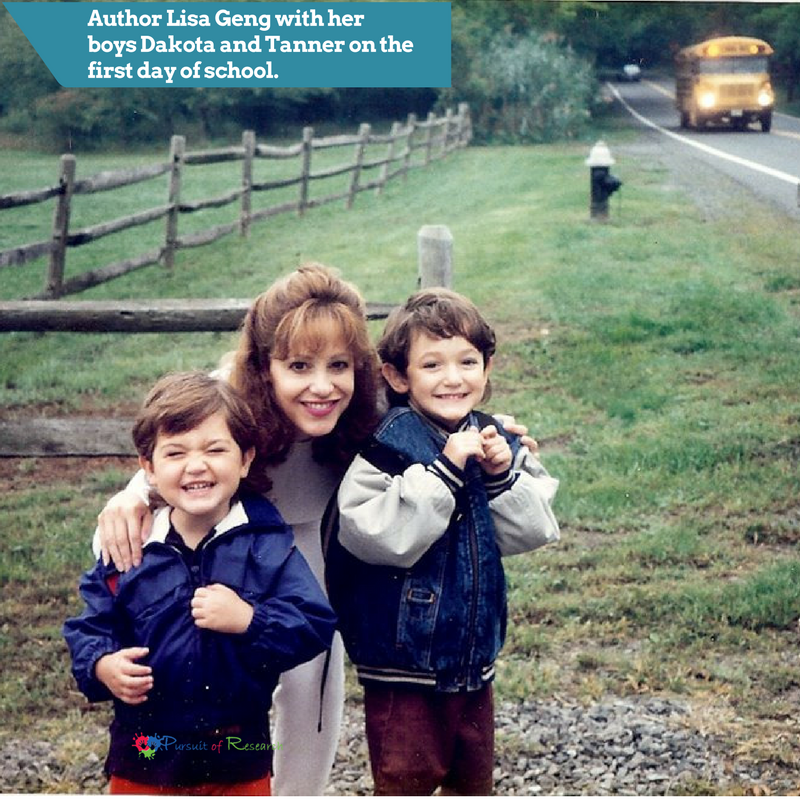
Tanner had to learn how to smile due to his oral apraxia. When Tanner was learning to smile he would smile and close his eyes. We’d then say “Tanner open your eyes” and he’d open his eyes and open his mouth. Then we’d say “Smile again” and again he’d smile and scrunch his face like in this photo again which was his classic smile for awhile. Learn more about oral apraxia here. See Tanner today here.
“They, you, we, all of us, will be fine”
More Resources To Help
- Planning Your Child’s Transition To Preschool: A Step-by-Step Guide for Families by Lynette K. Chandler, Susan A. Fowler, Sarah Hadden, and Lisa Stahurski A publication of FACTS/LRE, University of Illinois at Urbana-Champaign
- Separation Anxiety In Young Children From Northern County Psychiatric Associates Carol E. Watkins, MD
- Separation Anxiety Approved by the BabyCenter Advisory Board (over 15 medical doctors from all over the US)
- Sample Letters To Your Child’s Teacher
- The Communication Book
